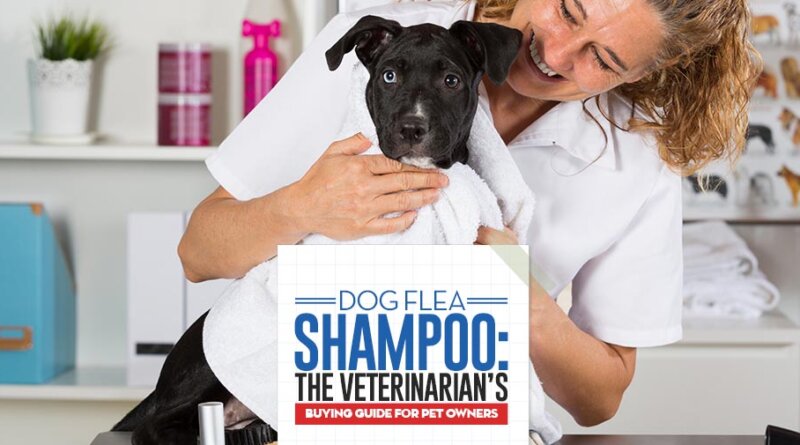How to Pick the Best Shampoo for Your Dog (Based on Studies)
Picking the right type of shampoo for dogs and their specific coat type is an important step. Dogs have natural oils in their skin that keeps their coat healthy and looking shiny, but dead skin, dirt, debris and other gunk can accumulate there and cause the oh-too-well-known “dog smell”.
The smell isn’t the only or even the worst problem. Not bathing your dog can result in a variety of skin infections (1, 2). Proper grooming procedures with the right dog shampoo are essential to avoid these issues. But many pet owners are often confused: what’s best, what’s vet recommended and what should be avoided?
In my veterinary practice, I have many dog owners ask me about the best dog shampoo to use for bathing their flea infested pet, which type is better for what situations and what bathing products can be dangerous. In this article, I will answer these and many other questions related to bathing dogs and picking the right shampoo for your dog.
How to Pick the Best Shampoo for Your Dog
Dog Bathing 101
Bathing basics are simple for most healthy dogs. It’s recommended to give a dog a bath about once every 1-3 months for general maintenance, and not more often. But this schedule may change due to some variables: a dog’s activity, environment, health status, coat type and the sensitivity of a dog owner’s nose.
The 1-3 month schedule is a good rule of thumb to go by. A typical dog should not have too much of the “doggy smell” in-between baths as long as he is kept clean and dry. Some people are more sensitive to smells than others and this should be considered every time you think your dog needs a bath.
Bathing Frequency
Note that certain dogs always have that “doggy smell” no matter how often you bathe them. In cases like this, have your veterinarian examine your pooch before bathing any more frequently than once every 10 days. Your dog’s persistent foul smell could be a sign of a skin infection or other skin disorder like seborrhea.
In most cases, frequent bathing of dogs is not recommended, unless you’re following your vet’s guidance for treating your pet for skin infections or disorders like seborrhea or pyoderma. Bathing your dog more than once every 2 weeks can strip your dog of natural, healthy skin oils – predisposing him to skin disorders and dry, itchy skin.
Bathing for Skin Disorders
While bathing a dog often is not recommended in most cases, dogs with skin issues such as atopic dermatitis (allergies), pyoderma, active skin infections, or seborrhea (excessive oily or excessive dry skin) will definitely benefit from specific, much more frequent bathing with a specific shampoo type until the condition resolves.
Research shows that bathing your dog daily or every other day is an effective way to deal with a number of skin problems. This works because it removes all crust and scaling that contains bacteria. Studies show that when paired with antimicrobial treatments or medicated shampoo, frequent bathing resolves majority of skin problems within a few weeks and also makes some antibiotic treatments more effective (3, 4, 5).
That said, not all skin conditions permit frequent bathing, in which case only topical treatments can be used instead of a bath. Fortunately, there enough conclusive evidence demonstrating that using skin infection treatments alone can also be very effective for completely ridding the dog off bacteria and restoring the dog’s skin health (6).
How to Choose Over-the-Counter Shampoos for Dogs
There are several things to keep an eye out when shopping for dog grooming and bathing products, and especially shampoos. Most top rated over-the-counter dog shampoos are excellent for dogs that are bathed infrequently. They help to restore moisture to the hair and skin, while providing gentle cleansing without damaging the dog’s coat. But what shampoo should you use for frequent bathing?
What to Look For…
When shopping for a good dog shampoo to be used on a normal and healthy dog without any skin problems that you’re going to bathe every 1-3 months, look to select a single product with the following aspects:
- Oatmeal-based
- Soap-Free
- Fragrance-Free
- Hypoallergenic
- Contains moisturizing sources of oils or fats, such as:
- Coconut oil
- Olive oil
- Vitamin A, E
- Omega-3 Fatty Acids
- Contains soothing ingredients, such as:
Not all of these ingredients and aspects are essential, but if you find a shampoo for dogs that has all or majority of them on the label, you can easily consider it to be one of the best dog shampoos out there for “standard bathing” practices.
What to Avoid…
Conspiracy theories aside (some of which come from holistic vets and aren’t scientifically proven), most OTC dog shampoos and all prescription-based products are safe for dogs and there are very few things you need to avoid from what’s available to buy on the market today.
However, there is one thing that you should never see on dog shampoo label:
You may think that fragrances are the way to go because they help “mask” any sort of doggy smell in-between bathing and there are certainly a lot of new brands of shampoo for dogs that contain different type of fragrances. While they do help with making the dog smell better, the problem is that dogs can develop sensitivities to fragrances, and there are reports showing that they may also be carcinogenic.
Dogs also have sensitive noses, so fragrances that seem fine to us may cause problems for your pet, in particular respiratory irritation that can lead to more serious problems.
Moreover, fragrances, once mixed with the oils of the dog’s skin and other stuff your pooch gets into, may not smell so good after several days. It will just smell “off.” Fragrances may also irritate others in the household, including children and cats.
Vet Recommended Dog Shampoo
I generally do not recommend any specific shampoo for dogs because once you know what to look for and what to avoid, it’s easy to pick something in your price range and what’s available to you. Once again, most OTC shampoos for dogs will be fine.
If you need a specific recommendation, I would suggest this list of best dog shampoos reviewed by editor Samantha, as most of those choices are very appropriate. For a few more specific vet recommended dog shampoo suggestions, here are some below.


Earthbath is a good brand that’s been around for a while, but if the above options aren’t available, you have plenty more choices. Below are a few more recommendations.
Flea and Tick Shampoo for Dogs
I do not recommend buying any flea or tick shampoos. These type of “medical” dog shampoos are a thing of the past (or at least should be).
Yes, they still exist and new companies keep manufacturing “better” and “safer” flea shampoos, many of which still contain harsh chemicals that can dry out a dog’s skin and cause toxicity. This is because the only way to fight fleas and ticks is with strong chemicals, so you can’t have a completely safe shampoo that’s effective for parasites.
Furthermore, unlike specific flea treatments, dog flea shampoos are rarely effective. The chemicals may help to temporarily drive away fleas and ticks from your pet’s body, but the effects are not long-lasting enough to prevent these parasites from jumping on your dog shortly afterwards. This has been demonstrated in several studies (7, 8) all of which clearly show the lack of effectiveness of any type of flea shampoo for dogs.
Here’s an excerpt from one of the studies:
“Regular weekly shampooing of dogs did reduce the number of fleas compared to the controls, but it was not sufficient to eliminate flea burdens as shown by the fact that only one dog in the shampoo group was free of fleas…”
Most of these studies share the same sentiment where flea shampoos are either barely effective or not effective at all. The above and other studies also demonstrated that dog groups treatment with actual flea and tick treatments responded much better and proper flea/tick treatments such as flea drops had a 99.5% efficacy.
The bottom line: if you are concerned about fleas and ticks, skip flea shampoo and talk to your vet about a trusted, long-lasting oral or topical flea/tick product, or flea collars (I wrote more about them here). If your dog receives frequent baths, consider using an oral product. There is also evidence that bathing your dog does not reduce the efficacy of flea and tick treatments (9, 10).
Tea Tree Oil Shampoo
Tea tree oils, including essential tea tree oils, is a popular health trend among new brands of shampoo for dogs. While there are some benefits of tea tree oil (when used correctly and separately), shampoos with high concentration of tea tree oil should be avoided. This is because studies done on the use of tea tree oil with pets (both cats and dogs) show that shampoo concentrations can be toxic to pets (11).
Tea tree oil by itself is often used in a pure form by well-meaning pet owners attempting to control fleas and ticks, or for other skin issues. Such applications often lead to a dog’s weakness, muscle tremors, hypothermia and other nervous system symptoms.
While I do not generally recommend shampoos with tea tree oil, note that there are many pet shampoos and hot-spot treatments out there that contain tea tree oil and are safe for bathing your dog. The reason is because in these brands, tea tree oil is often so diluted in the product that it does not pose a toxicity issue.
How to pick tea tree oil shampoo: If you simply must try a product with tea tree oil, make sure that it is one of the last ingredients listed on the label – as most labeling lists the highest concentration ingredient first and least concentration last. Talk to your vet before buying any, too. As for recommending specific brands, I personally cannot recommend any.
Frequent Bathing Guidelines

If you must bathe your dog frequently:
First, try to brush off as much mud and gunk as possible and then rinse, rinse, and rinse some more just with water until the water and coat runs clean. No shampoo is used here. Dry the dog off with a pet towel and re-evaluate. This may be sufficient for keeping your dog clean enough to go into your home.
However, if you find that your dog needs a bath after every training session in order to bring him back into the house, consider using the least harsh dog shampoo possible. The five brands I’ve mentioned above are much less likely to dry out the skin and will add in vital moisture to the protective oily layer of the dog’s coat and skin.
Dogs with Skin Problems
Like I’ve mentioned above, if your dog suffers from any type of skin disorder, always talk to your veterinarian before setting off on a bathing regimen or picking out a specific shampoo for dogs. Different skin conditions require different treatments.
For active skin infections, specific medicated baths using a medicated shampoo should be given per veterinary instruction, often 1-2 times a week and sometimes even daily (depending on the infection and skin condition). Once the infection is clearing or resolved, normal bathing (every 1-3 months) can be resumed.
Specific medicated baths (PDF) exist to treat a variety of skin ailments on dogs, from yeast and bacterial infections to more severe seborrhea. A medicated bath is called that way because you’ll be using a medicated shampoo (OTC or vet prescribed) that will help to prevent the need for oral antibiotics, but it depends on the situation.
As an example, below are some products you should know about that are recommended by vets as prescription-only. Do not try to purchase them yourself; they should only be used on the dog under the direction of your veterinarian. Many name-brand and generics are available, and they will often include ingredients like:
- Ketoconazole (anti-fungal, for yeast infections)
- Chlorhexidine (anti-microbial, for bacterial infections)
- Sulfur (anti-itch, drying, anti-microbial, used for seborrhea)
- Salicylic acid (lowers the pH of the skin, thus moisturizing keratin in the skin)
- Benzoyl peroxide (helps to de-grease oily seborrhea, anti-microbial, helps treat mange and ringworm in dogs)
Many studies have demonstrated the effectiveness of these ingredients on majority of skin infections in dogs, and the same was replicated with the use of shampoo for dogs that contain them. However, they can also be damaging if used improperly due to their strength, therefore, always consult with a vet and get a prescription for one of these products if your pooch is suffering from a serious skin disorder.
Solutions for Itchy Dogs
Some dogs just seem to be excessively itchy, be it due to dry skin, an underlying allergy or skin condition. If your pooch hasn’t yet scratched himself into needing any veterinary attention, it may be worthwhile to try a soothing bath to help relieve that itch, or try using some type of itch relief methods.
Some dogs that are prone to getting skin infections or dry, itchy skin can also benefit from having baths using specific bathing products that are formulated at relieving itching in dogs. The two shampoos for itchy dogs that I recommend are:
Virbac’s shampoo for dogs is a step above most other over-the-counter pet shampoos that I’ve mentioned (and are also more expensive). They contain patented moisturizing technology called spherulites. These spherulites act almost like a “time release” of moisturizer on a dog’s skin and hair, and help to relieve itching, among other things.
Spherulites microcapsules in such dog shampoos use glycotechnology which by itself helps in reducing both yeast and bacterial adhesion on a dog’s skin. Due to their structure, this physically disrupts colonization of microorganisms which then prevents irritation.
Many itchy dogs will also benefit from an after-bathing post-shampoo application of a crème rinse or conditioner. There are several dog conditioners available for purchase, but I cannot vouch for most of them. However, the one that I do often recommend to pet owners in my veterinary practice is made by Virbac using their patented formula:
If you are using a Virbac shampoo for dogs that I’ve mentioned above, this Vicbac dog conditioner/creme rinse pairs nicely to help keep your pet protected and moisturized between bathing, and it’s very effective for reducing itchiness in dogs.
As a final resort, there are a few other itch relief remedies you can try, but most of them are rarely effective unless your pet only has a very mild itching problem.
This is everything you should know about buying a good shampoo for dogs that’s appropriate for your individual pup, and properly bathing your dog. As always, if you have concerns regarding your dog’s skin or hair – contact your veterinarian and/or grooming professional for further guidance.
READ NEXT: 5 Itchy Dog Home Remedies







